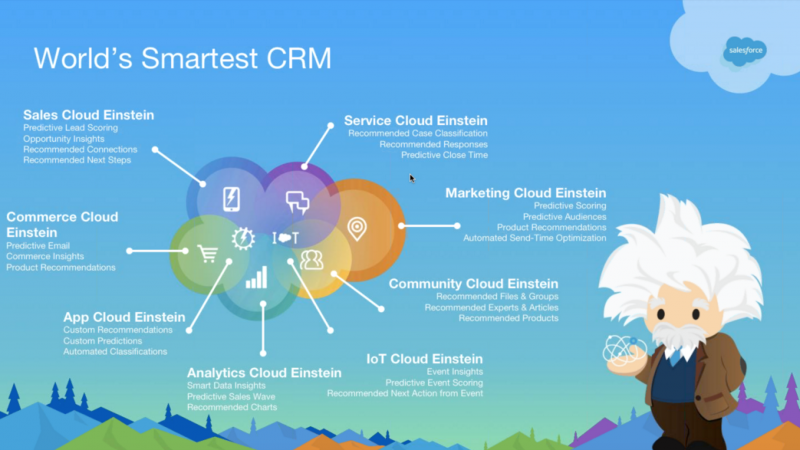Can Salesforce Really Prescribe An End-to-End Sales Process?
Last week, nearly 170,000 business and technology professionals descended onto San Francisco for Salesforce’s annual conference, Dreamforce. The event itself was ripe with discussions on social responsibility and charity, but most attendees, including myself, attended for other reasons. We wanted Salesforce to pull back the curtains on what it saw for the future of sales.
Once things got underway, Salesforce’s Einstein took center stage… quite literally. We’ll get to Einstein in just a bit, but not to be overshadowed by Einstein, Salesforce unequivocally made their keynote about sales. 2016 was a landmark year for Salesforce and their commitment to sales. They closed on their acquisitions of SteelBrick and Demandware, and used Dreamforce as the stage to rebrand them as Salesforce CPQ and Commerce Cloud respectively. So what does all this mean? It means that regardless of sales channel, Salesforce is fighting harder than ever to be your selling platform of choice… and they make a pretty compelling case.
Let’s take a closer look at the case Salesforce is making. To do so, we must understand Salesforce’s pillars of technology supporting sales.
- Sales Cloud delivers core CRM functionality for sellers. Sales Cloud is the bread and butter for Salesforce. For many of its customers, Sales Cloud represents the foundation of technology enabled selling processes. From account and opportunity management to pipeline management and white space analysis, Sales Cloud helps sales and sales leaders strategize and prioritize their sales efforts.
- Salesforce CPQ allows sellers to extend Sales Cloud with Quote-to-Cash. Where Sales Cloud fell short for many, Salesforce CPQ picks right up. With Salesforce CPQ, sellers are able to build out orders, generate unique quotes, and execute on billing processes. Salesforce delivers these capabilities to sellers to expedite the sales process, drive stronger margin performance, and guide sellers toward value-add solutions for their customers.
- Commerce Cloud unifies digital commerce across channels. Salesforce’s latest acquisition of Demandware enables them to deliver solutions to companies that need to better serve their customers and deliver 1-to-1 shopper experiences via eCommerce or digital touchpoints at retail locations.
I said we’d get back to Einstein, so how does it fit into all of this? For several months Salesforce has teased its customers with the promise of intelligent applications. Underpinning these applications is Einstein, an amalgamation of acquisitions and developments to deliver predictive analytics, machine and deep learning, and natural language capabilities to augment and enhance selling processes. Salesforce, like its competitors, promises to deliver contextually relevant recommendations and equip sales reps with the necessary insights to closer more business, but what separates them from the pack is they:
- Keep the nuts and bolts hidden to the user. Salesforce’s best decision in rolling out Einstein was to name it Einstein, and not because of the connotation to the famous physicist. By naming it Einstein, they made this layer of the platform a lot more accessible. Folks in sales ops should not be intimidated by the tool. With a sleek UI, it doesn’t feel terribly data science-y to the user.
- Provide very discrete persona-based use cases. One of the areas that companies struggle with is around how to leverage these technologies. Salesforce has already identified several use cases to aid sales, including predictive lead scoring and recommended next actions, whereas their competitors are more cautious to share what they can deliver and when.

The future analytics-driven sales processes is bright, but the path ahead is not without its challenges. Current and potential Salesforce customers should be mindful that intelligent recommendations require a large volume of quality data. If poor data goes in, poor recommendations will come out. Cleansing data and iterating the fine-tuning of recommendations will be vital to long-term success. Another major hurdle is adoption. Many sellers still lack trust in “intelligent” recommendations. You will need to handhold these sellers until they form trust. This means starting with small recommendations and scaling from there.
Einstein wasn’t the only announcement at Dreamforce but it was certainly the biggest. What are your reactions to Einstein? Are you excited or leery about this wave of innovation? What do you see as your biggest barriers to adoption and success? As we move into 2017, I’ll be focusing a lot on prescription and the role of analytics-driven sales processes, so stay tuned into my research by subscribing here and following me on Twitter @john_bruno.